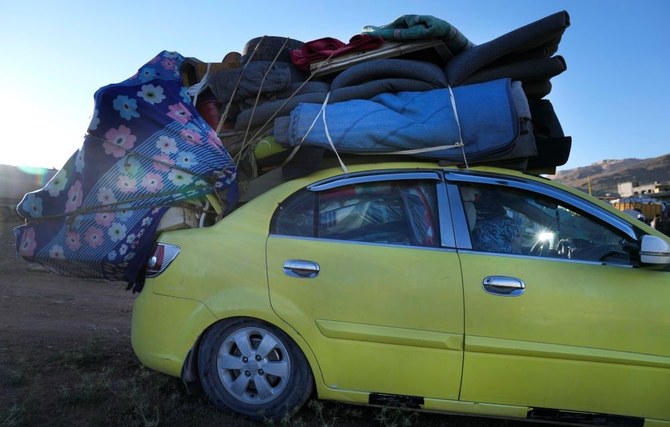
Lebanese General Security chief says 330 people were on list of returnees but some decided not to go because they might face legal issues or are wanted by the security forces
UN Refugee Agency says all refugees have right to return home and ‘we work steadfastly with countries to try to ensure all returns are voluntary and in safety and dignity’
BEIRUT: A total of 225 refugees, including women and children, voluntarily returned to Syria from Lebanon on Tuesday after being assured it was safe for them to do so, as part of a repatriation campaign organized by the Lebanese General Security. Previous operations of the same kind were put on hold in 2020.
The returnees, some of whom were registered with UNHCR, the UN’s Refugee Agency, traveled by land from Wadi Hamid in the town of Arsal and entered Syria through Al-Zamrani and Al-Qaa border crossings. They then headed to the Syrian towns and villages from which they had been displaced by the war, taking with them agricultural equipment and livestock in cars and trucks rented in Arsal.
Their convoy was accompanied in Lebanon by two security teams. The head of the General Security’s Operations Bureau, Brig. Gen. Jamal Jaroush, and the commander of the participating force, Col. Ghayath Zeaiter, worked in coordination with Syrian authorities, which provided security for the convoy after it crossed the border and made its way to villages in Western Qalamoun, Damascus and the surrounding countryside.
“The number of Syrians registered on the General Security lists for return was 330,” Brig. Gen. Mounir Akiki of the General Security told Arab News.
“Since the return is voluntary and not mandatory, and must be safe, we submitted a list of those willing to return to the relevant Syrian authorities and it turned out that some of them have legal claims (against them) or are pursued by the security forces. The refugees were notified of this matter and some of them changed their minds about returning. However, others decided to return despite this and resolve the pending issues on Syrian territory.
“Not all returnees are registered on UNHCR lists. The UNHCR lists that were handed over to the Lebanese General Security include about 1.5 million Syrian refugees, including 706,000 people who were registered after 2015. However, the total number of Syrian refugees is about 2.1 million. In addition to those registered with UNHCR there are Syrians who entered (Lebanon) clandestinely, with no precise figures about them, only estimates, as well as seasonal workers with legal residency.”
Dalal Harb, a spokeswoman for UNHCR, told Arab News: “In Lebanon, UNHCR works very closely with the General Security Office. The GSO is facilitating, on behalf of the Government of Lebanon, the return of Syrians who expressed their wish to return and registered with GSO to do so.
“While the GSO-facilitated return movements are not a UNHCR process, UNHCR is involved and works closely with GSO and others in reaching out to and counseling refugees, when possible, and being present at the departure points prior to their return.”
Asked about the role of the UN agency in encouraging or discouraging the return of Syrians to their home country, and checking whether they were doing so of their own free will, Harb said: “On the day of a GSO-facilitated return movement, UNHCR is present at the different staging points to observe the process and provide on-site assistance to refugees.
“During the last GSO returns, UNHCR spoke to some of the families returning as they were preparing to leave. Many of the families, who confirmed that they would be returning as part of the GSO-facilitated return movement, said they themselves had decided to return. UNHCR did not speak to all individuals returning.
“UNHCR maintains that every refugee has the right to voluntarily return to their country. We work steadfastly with countries to try to ensure all returns are voluntary and in safety and dignity.”
The Lebanese parliament was due to meet on Wednesday to discuss the issue of Syrian refugees. There has been a growing debate in Lebanon of late about their presence in the country amid reports of a rise in crimes linked to refugees, including murders, kidnappings and thefts. This has led to widespread calls among the Lebanese people for the refugees to return home.












